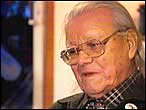| ________________CM
. . . . Volume VIII Number 2 . . . . September 21, 2001
Ojigkwanong: Encounter with an Algonquin Sage is the story of William Commanda, an Algonquin elder
born on Quebec's Maniwaki reserve. Many of the challengeshe faced are commonplace for Inuit and Aboriginal
people: displacement, denial of culture, terrible poverty (the story of his family's near-starvation
as a reservation and met with Prime Ministers and other top-level government leaders in the attempt to seek
just ice and fair settlement of land claims. His active role in seeking this redress came about
as a result of a vision he had in 1961, when, desperately ill, he dreamed of a "Circle of all Nations."
Miraculously, he recovered, and since that time, has pursued a message of peace and reconciliation,
not only between historic adversaries (the Algonquin and Iroquois), but also with those who oppressed
him and his people: the whites who he once hated and admitted that, if he could have, he would hae done them ill.
Recommended. Joanne Peters is a teacher-librarian at Kelvin High School in Winnipeg, MB.
To comment on this title or this review, send mail to cm@umanitoba.ca. Copyright © the Manitoba Library Association. Reproduction for personal use is permitted only if this copyright notice is maintained. Any other reproduction is prohibited without permission. Published
by
TABLE OF CONTENTS FOR THIS ISSUE - September 21, 2001. AUTHORS | TITLES | MEDIA REVIEWS | PROFILES | BACK ISSUES | SEARCH | ORDER | CMARCHIVE | HOME |
